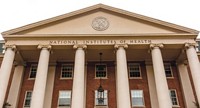Advertisement
Grab your lab coat. Let's get started
Welcome!
Welcome!
Create an account below to get 6 C&EN articles per month, receive newsletters and more - all free.
It seems this is your first time logging in online. Please enter the following information to continue.
As an ACS member you automatically get access to this site. All we need is few more details to create your reading experience.
Not you? Sign in with a different account.
Not you? Sign in with a different account.
ERROR 1
ERROR 1
ERROR 2
ERROR 2
ERROR 2
ERROR 2
ERROR 2
Password and Confirm password must match.
If you have an ACS member number, please enter it here so we can link this account to your membership. (optional)
ERROR 2
ACS values your privacy. By submitting your information, you are gaining access to C&EN and subscribing to our weekly newsletter. We use the information you provide to make your reading experience better, and we will never sell your data to third party members.
Policy
National Academy says proposed human subjects regulation should be scrapped
Panel recommends different take on Common Rule
by Andrea Widener
June 30, 2016
| A version of this story appeared in
Volume 94, Issue 27
Regulatory relief for research
The National Academy of Sciences’ recommendations to the government in its second report on federal research regulations included:
Human subjects: Abandon proposed changes to human research subject protections and instead appoint an independent commission to study the subject.
Select agent: Choose a single agency to regulate biological agents and toxins that could be a public health threat and reform the inventory and access systems for them.
Export controls: Reform regulations that limit international sharing of information that could have a potential military use and include universities in those discussions.
Intellectual property: Transfer responsibility for a federal invention tracking system to the Department of Commerce and boost funding so it can be made easier to use.
In a surprise move, a National Academy of Sciences panel is recommending that the U.S. government abandon its effort to rewrite rules that protect people participating in federally funded research.
Instead, the panel recommends that the government create an independent commission to reexamine the regulations governing human subjects, collectively known as the Common Rule.
The recommendation is part of a larger NAS study of federal regulation of research. These rules are viewed as excessive, placing a major burden on scientists and research centers that receive federal funding. Federal requirements for protecting human subjects were part of the charge for the NAS panel, which began its work in early 2015.
In September 2015, 18 federal agencies led by the Department of Health & Human Services (HHS) proposed reforms to the Common Rule, which has been in place since the 1970s. Those planned changes included tighter informed consent requirements to ensure that study participants understand the scope of the research and narrowing the number of institutional review boards that examine multisite studies.
“Our committee found that the proposed rule is marred by omissions, an absence of essential elements, and a lack of clarity,” says Harriett Rabb, cochair of the panel and vice president at Rockefeller University.
The proposal is unpopular in the science community. An analysis by the Association of Public & Land Grant Universities and the Council on Governmental Relations found that 95% of written public comments about the proposal opposed one or more of the planned changes. More than half addressed a provision that would require consent to use blood or tissue samples that were originally collected for another purpose, even if the donor is anonymous.
An HHS spokesperson said the agencies are reviewing the NAS report as well as the 2,100 comments on the proposal. “We take all public comments seriously and are considering them as we develop the final rule,” the spokesperson says.
Toby Smith, vice president for policy at the Association of American Universities, hopes the recommendation to withdraw the proposal will pressure HHS and the other agencies to take the criticism seriously. “There are strong concerns from the scientific community and for that to be ignored in the final rule would be really unfortunate,” Smith says.
The NAS panel’s report is the second of two parts on research regulations. The first recommended a public-private research policy board to streamline research regulations going forward.



Join the conversation
Contact the reporter
Submit a Letter to the Editor for publication
Engage with us on Twitter